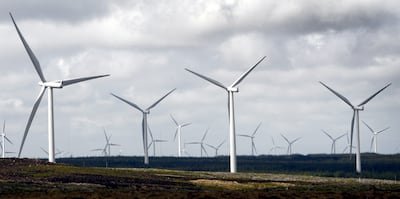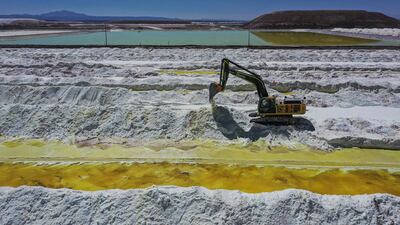British governments have not taken the supply of critical metals and minerals seriously enough, leaving the economy vulnerable, according to a report from parliament.
"Successive governments have failed to recognise the importance of critical minerals to the UK economy and failed to respond adequately to the aggressive capture of large parts of the market over the last three decades by China," said the report, published by the foreign affairs committee on Friday.
The report is titled A Rock and a Hard Place: Building Critical Mineral Resilience.
"Allowing a single country to dominate the UK’s critical minerals supply chains shows a lack of foresight and has left the current government with a mountain to climb to address the consequent vulnerabilities and protect the country’s economic resilience."
Brian Menell, chief executive and chairman of TechMet, one of the world’s leading critical metals investment companies, told The National that "building robust critical metal supply chains is essential for future economic security, as well as meeting the national green energy and climate targets".
Critical metals and minerals are those natural resources considered essential to a country's technology sectors, energy transition and national security.
They are found in products that power economies, but are often mined thousands of kilometres away.
The UK has a list of 18 of these critical raw materials, or CRMs, which includes lithium, cobalt and graphite to make batteries for electric cars, silicon and tin for electronics, and rare-earth elements for electric cars and wind turbines.
Competition among countries to acquire them is fierce and growing.
The International Energy Agency forecasts that by 2040, the world will need four times the critical minerals – for clean technologies – that it uses now.
The committee's report notes that where the UK has fallen behind, China has stormed ahead.
"China has strategically embedded itself in the middle of the critical minerals supply chain, developing the vast majority of the world’s refining capacity," said Alicia Kearns, chair of the House of Commons foreign affairs committee.
“For three decades we have been asleep at the wheel, repeatedly failing to recognise the importance of critical minerals and the dangers of our current reliance on autocratic countries.
“It is particularly clear that we need to confront the weakness created by our dependency on a single state: China. These minerals power modern life and if China pulls the plug, we will all pay the price."
Mr Menell told The National that "governments must look at ways of unlocking meaningful funding to ramp up global production and find ways of incentivising domestic businesses across the critical metal value chain".
"The world should have been deploying hundreds of billions of dollars several years ago if we were to be in a position to adequately supply the energy transition."

'Strategic vulnerabilities'
The committee has been looking at the critical minerals issue for more than a year.
Members travelled to Chile for a clear understanding of the "geological and geopolitical context" of the country that supplies 30 per cent of the world's lithium.
Of the 18 critical minerals on the UK's list, most are mined in single countries.
For example, 98 per cent of the world's niobium, which is used in alloys for jet engines and in the construction sector, comes from Brazil.
Likewise, a huge slice of the global supply of cobalt comes from the Democratic Republic of the Congo.
But 12 of the UK's 18 critical minerals come from China, and the committee report points out that the UK's "economic resilience and national security depend on critical minerals".
The committee recommends that the UK diversify its supply of critical minerals through bilateral agreements with producer countries, in the same way that it has established such pacts with Canada, South Africa, Saudi Arabia, Kazakhstan and Australia.
"We recommend that the government assess the strategic vulnerabilities it reports in the UK’s critical minerals supply chains and map those to a diplomatic agenda to develop bilateral relationships that will best support the UK’s economic and security resilience," the report said.
Mr Menell pointed to the dominance that China has built in the supply of most critical minerals over the past 20 years.
"While the UK, EU and other western countries are a long way behind, there is still a lot that can be done to narrow that gap, if they start acting with the required urgency," he told The National.
"As a start, it could be much more proactive in engaging with emerging economies to build long-term, mutually beneficial partnerships."
'Power, not trade'
The committee also criticised the government’s decision not to assess the vulnerabilities and dependencies in the UK’s industrial supplies before producing the Critical Minerals Strategy this year.
It said the strategy itself is in need of refreshing.
“The government must be able to provide UK industry, as well as current and potential trading partners, with a coherent plan to build critical minerals resilience," Ms Kearns said.
"We need to move beyond strategy documents and towards implementation, providing clear priorities and supporting industry to deliver.
"We are in a global competition for technological advantage which we cannot afford to lose.
“This is primarily about power, not trade. The supply of critical minerals is more a geopolitical issue than a geological one.
"The scale of the challenge ahead of us is huge, but the need to act now is undeniable.”
Mr Menell agreed with the committee that successive UK governments have not taken the link between critical minerals and economic growth seriously enough and that "the cost of failure will be the loss of key industries, such as the automotive sector and green tech industries".
"In the coming years, increasing demand for the critical metals required to build green technology will outstrip the mining sector’s ability to produce sufficient quantities," he told The National
"Therefore, governments must have the foresight to build critical metals supply chains now to ensure future domestic green industries will have sufficient supplies of the key inputs – critical metals such as lithium, nickel and rare-earth metals."


